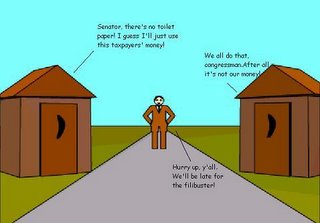
Note: This is Part One of a multiple part series entitled "Depolarizing Politics." The author isn't sure, at this point, about when the other parts will be posted, or how many other parts there will be.
Imagine having a job with an annual salary of six figures. Now imagine that your job is to spend other peoples' money, not necessarily for what they think is right, but for what you think is right for them. You are imagining that you are a U.S. congressperson.
And what a job it is! If it weren't for the lobbyists, who are there to convince you what you think is good for your constituents, you might actually have to represent the folks who elected you. You got your job by promising better education, but when came the time for funding better education, it was more important to fund a new airport. You are not alone in doing things this way; in the past ten years Congress has introduced and passed more bills for earmarked (aka porkbarrel) funding than in the entire history of the United States. You got your job by promising a National Health Insurance plan, but when the time came to vote on that, you thought it would be better to fund an investigation of the pharmaceutical manufacturers. And to prove that you are tough on crime, you created another victimless crime and passed a bill funding the enforcement of such. Creating victimless crimes is good for the people, because it helps your buddies in the legal profession, cuts the competition for your favorite limited liability corporation (the one that paid you a very generous campaign contribution), and it helps the insurance companies make larger profits.
And you got your job by promising to create more jobs, which indeed you did, by creating more bureaucracy to provide government jobs for your friends and family. And didn't you hire all sorts of legal advisors, interns, pages, secretaries, public relations experts, and press agents? The good thing about that is the taxpayers foot the bill to pay all your hired hands. After all, if you don't use your entire budget, you might not get as much to spend next year.
Remember when you promised that you would raise the minimum wage? But, when the minimum wage increase was introduced for a vote, you decided it was time to call for a closed session so that you and your fellow party members could investigate intelligence sources. Once again, the minimum wage measure indefinitely, but, at least you showed the people that you were doing something.
And you prove you are doing something by talking. You talk whenever the cameras are on you. During congressional hearings, you take forty-five minutes to ask a fifteen second question, so that you may use the opportunity to express your views and tell the world what you stand for. If a bill comes up that you don't like, perhaps because it doesn't carry enough "pork" for your district, rather than coming up with a compromise, or even a better plan, all you have to do is filibuster, that is, to debate the measure until it dies.
It is politics as usual and it is the way everybody does things. Presidents Reagan, Clinton and G.W. Bush each tried to go outside the politics as usual box, and each faced huge dissenting public outcry, incited by opposition politicians who don't believe you should go outside that box.
It is politics as usual and it is, by far, the greatest waste of taxpayers' money of all.
Now imagine we had a Congress which followed the guidelines set in the Constitution of the United States. In the Constitution, rather than representing a party line, the Members of the House of Representatives represent the people of each congressional district. The Members of the Senate represent the people of each state. The President represents the people of the entire nation. There is nothing in the Constitution that suggests that any of these representatives represent a political party. The Constitution does not require that a person should belong to a political party to be eligible to be elected to office.
The Constitution states that each member of Congress "transportation to and from, and room and board during each session of Congress." That means, if you are elected to Congress, "don't quit your day job." How many career politicians with six figure incomes would there be today, if that were the case? That sure would save some of the taxpayers' money. Congressional sessions would only last a few weeks, rather than nearly an entire year, because every member of Congress would be in a hurry to get back to his or her job. There would be no time for special interests or filibusters, only to do what needs to be done, and be done with it. Now that would reduce the waste of taxpayers' money.














No comments:
Post a Comment